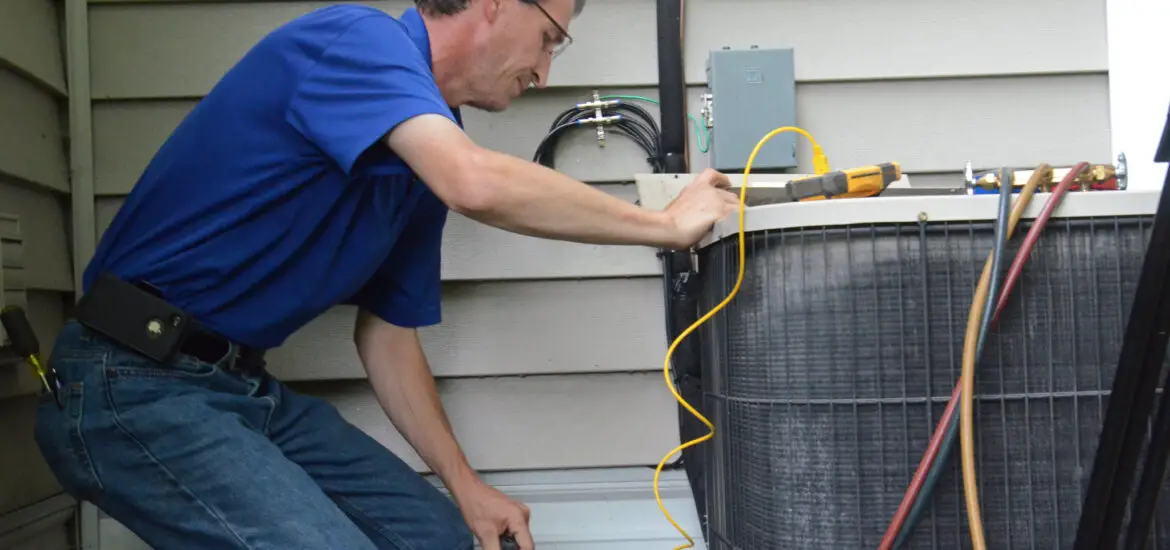If you’re wondering “why isn’t my AC taking Freon?”, this article has answers to this question and even solutions to this AC problem.

Why Isn’t My AC Taking Freon? [Reasons]
Several reasons can cause your AC to stop taking Freon. Identifying the exact cause is critical to finding the right solution.
Refrigerant Leaks
Refrigerant leaks are a primary reason for an AC’s failure to take Freon. These leaks usually occur in the refrigerant lines, evaporator coils, or around the compressor. Causes include corrosion, wear and tear, or physical damage.
A small hole or crack can result in significant Freon loss, impacting the system’s ability to cool your home. Signs of a leak include a noticeable decrease in cooling efficiency, a hissing sound indicating escaping gas, ice formation on the AC unit, or an unexplained increase in energy bills.
Refrigerant leaks not only impair the AC’s function but can also harm the environment and pose health risks.
Blockages in the System
Blockages within the AC system, especially in the refrigerant lines, can impede the flow of Freon. These blockages are often due to accumulated dirt, debris, or other foreign materials that enter the system. The build-up of these materials can cause the refrigerant to flow inefficiently or even stop altogether.
Symptoms of blockages include reduced airflow from the AC vents, the unit blowing warm air, or fluctuations in cooling performance. Regular maintenance is key to preventing such blockages, as they can be difficult to identify and resolve without professional help.
Malfunctioning Compressor
The compressor is essential for the circulation of Freon in your AC system. If the compressor is malfunctioning, it can lead to the AC not taking Freon properly.
Common issues with compressors include electrical faults, wear and tear over time, or overheating. A common symptom of a failing compressor is unusual noises (clicking, buzzing, or rattling). Additional symptoms include the AC struggling to start, short cycling (turning on and off rapidly), or the unit not cooling effectively.
It’s crucial to address compressor issues promptly, as they can lead to more severe problems if left unresolved.
Issues with Evaporator or Condenser Coils
Evaporator and condenser coils play a crucial role in the heat exchange process of your AC system. Issues with these coils, such as dirt buildup, corrosion, or physical damage. These can hinder the AC’s ability to circulate Freon properly. Dirty coils can’t effectively absorb or release heat, reducing the system’s cooling capacity.
In severe cases, damaged coils can lead to refrigerant leaks. Signs of coil issues include ice formation on the coils, reduced cooling efficiency, or the AC running for longer periods without adequately cooling the space.
Solutions for Each Cause
Below are solutions to the problem at hand corresponding to each cause.
Fixing Refrigerant Leaks
To fix refrigerant leaks, first, try to identify the leak’s location. Small leaks can sometimes be patched, but larger ones or leaks in critical components often require part replacement.
It’s important to handle refrigerants carefully and comply with environmental regulations. Therefore, seeking professional help is advised.
After repairing a leak, the system must be vacuumed and recharged with the correct amount of Freon. This process ensures no air or moisture is trapped in the system, which can damage the AC.
Clearing Blockages
Clearing blockages in your AC system involves a thorough cleaning of the refrigerant lines, coils, and other components. This can include flushing the lines to remove debris and cleaning or replacing air filters to ensure unobstructed airflow.
In some cases, specialized tools are required to clear blockages effectively. Regular maintenance, including routine cleaning and inspections, can prevent blockages and keep your AC running smoothly.
Repairing or Replacing the Compressor
If the compressor is malfunctioning, a professional technician will need to diagnose the issue. Depending on the extent of the damage, the compressor may need to be repaired or replaced.
Compressor replacement is a significant undertaking that involves evacuating the refrigerant, removing the old compressor, installing the new one, and recharging the system with Freon. It’s a costly repair, so proper maintenance and early detection of issues are crucial.
Maintaining Evaporator and Condenser Coils
Maintaining the evaporator and condenser coils involves regular cleaning to remove dirt and debris that can insulate the coils. In cases of physical damage or severe corrosion, coil repair or replacement might be necessary.
It’s important to inspect these coils periodically for any signs of wear or damage. Professional cleaning can ensure they operate efficiently, extending the life of your AC system and preventing issues related to Freon circulation.
When to Seek Professional Help
If you’re unsure about diagnosing or fixing these issues on your own, it’s best to consult with a professional HVAC technician. In addition, regular maintenance by a professional can help prevent these problems and ensure your AC system operates efficiently and safely.